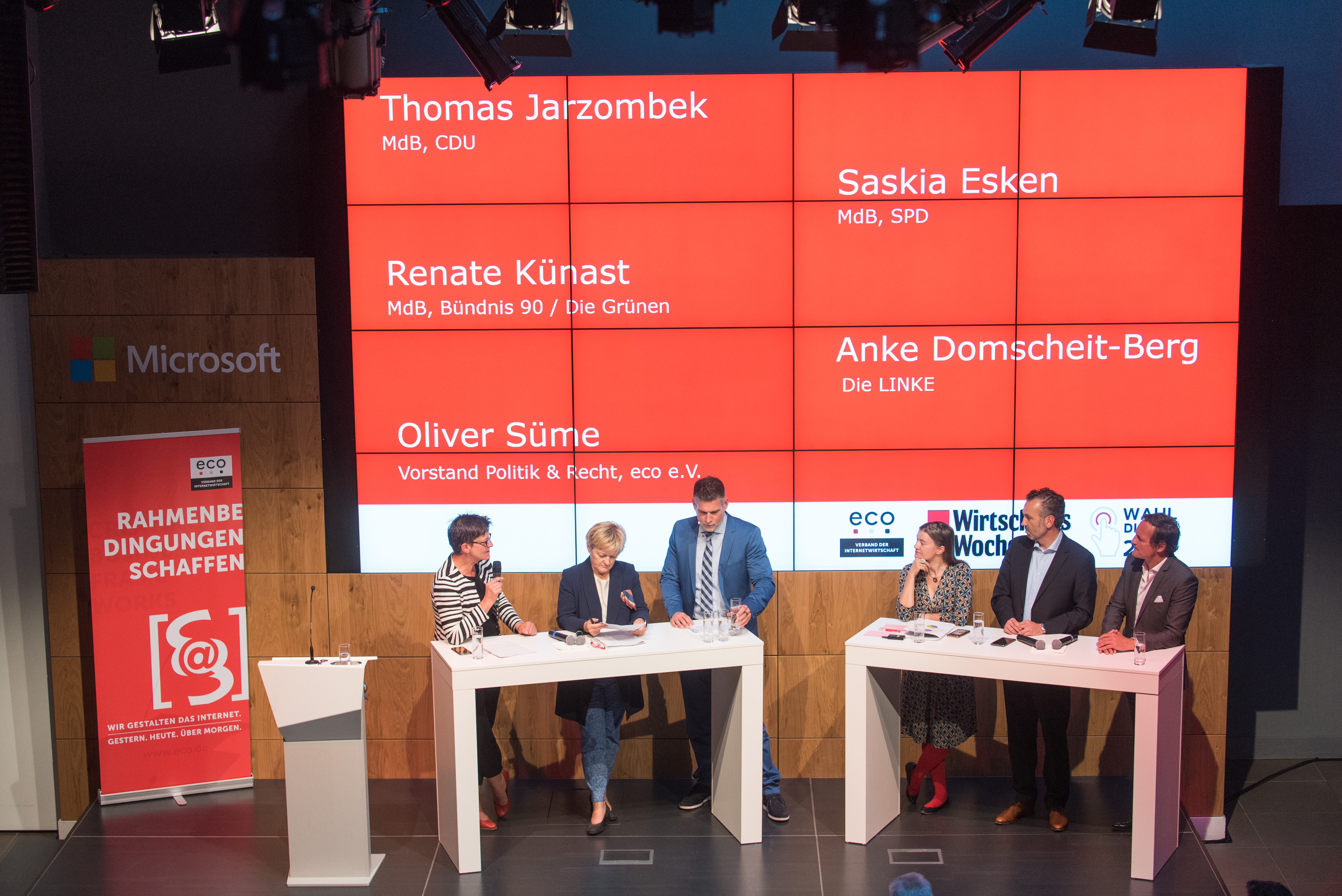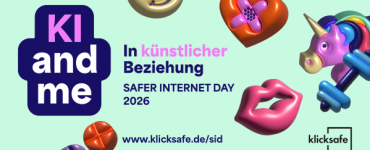-
Network Policy Forum: The Internet industry and politicians discuss core points for a new Digital Agenda
-
eco calls for more ambitious Internet policy goals for the coming legislative term
-
Internet Policy Party Check for the German federal election: Parties are still too vague
“More courage when it comes to digitalization and more ambitious goals for Internet policy.” This is what Oliver Süme, eco Director of Policy & Law, called for from a future federal government yesterday evening at the Network Policy Forum of eco – Association of the Internet Industry. Present at the Forum were Federal Minister for Economic Affairs Brigitte Zypries, Federal CIO Klaus Vitt, FDP Federal Chair Christian Lindner, and Internet politicians from the parties represented in the German federal parliament.
Federal Minister for Economic Affairs Brigitte Zypries affirmed that: “The digital transformation of the economy represents the central challenge for Germany as an industry location. We have achieved much in the past four years and have clearly driven forward the processes, for example with the White Book Digital Platforms and our Digital Strategy 2025. However, much still remains to be done to attain comprehensive digitalization, beginning first and foremost with broadband expansion, which will have to be more speedily progressed by the Transport Ministry. And naturally we also need to move ahead in the European context, given the goal of a unified digital single market.”
In the past three years, the federal government has achieved tangible progress in all Internet policy action areas within the framework of its Digital Agenda 2014-2017. Nonetheless, there is still the need for action in many areas. Above all, from the perspective of the Internet industry, the Internet policy goals of the coming legislative term must be formulated far more ambitiously than is currently evident in the election programs of the federal government parties.
“I therefore want to particularly urge Internet politicians from all parties to continue to broach the theme of digitalization with commitment and differentiation, and to strive for balanced legal regulations and regulatory frameworks which would make the Internet a secure space for all users, without jeopardizing the multitude of technological and economic opportunities offered by digitalization,” stated Süme. Now is the time to frame new phased goals for the second stage of Germany’s digitalization.
According to Süme, the greatest and most urgent political action requirements are broadband expansion and the development of a gigabit-capable infrastructure, the development of a truly European digital single market, and the spheres of digital education and further education as a guarantor for both responsible users in a smart world and for a new generation of future IT specialists.
The Internet Policy Party Check for the German federal election: Parties are still too vague
The Association also presented the results of its Internet Policy Party Check to the Network Policy Forum, which was compiled based on four events held between March and June 2017 with Internet politicians from the current parties represented in the federal government, and on an analysis of the official election programs.
Here (in the German language) you can find a visual overview and detailed descriptions of the Internet policy topics mapped out by the four parties in their election programs, including a profile of where their emphases lie and how the party positions relate to the demands of the Internet industry.
What emerges is that, while all parties acknowledge the value and the importance of infrastructure and network expansion, concrete plans for the advancement or financing of these are hardly mentioned. Here the two mainstream parties, CDU/CSU and SPD, uphold their commitment to the implementation goal of 2025. “Die Grüne” (the Greens) propose the sale of the Federation’s Telekom shares as a financing measure. When it comes to the institutional clustering of Internet policy in one ministry, the parties are very reticent. They regard the existing structures as sufficient. Only the Union wants to appoint a state minister for Internet policy in the next legislative term.
On the other hand, all parties see the need for action on the topic of digitalization of administration with references to open data and e-government. Furthermore, all parties investigated want to improve supports for start-ups in the IT field.
A further central feature is the security of IT products, an area in which almost all parties want to be active. Both the SPD and the Greens take a clear stance on the subject of dealing with illegal Internet content. In this area, both parties propose placing a stronger responsibility on the operators of Internet platforms than has been exerted until now. “Die Linke” (The Left) on the other hand takes a firm stand against the development of any type of blocking or surveillance infrastructure.
Controversial laws developed over the course of the current legislative term, such as blanket data retention, do not come in for criticism – at least not by the large mainstream parties. Regrettably, central issues like handling of media convergence or modernization of copyright law and the associated topic of ancillary copyright do not seem to be a focus of the parties, and are only peripherally mentioned in the election programs.
Further information available in German on the following:
Further information on the Network Policy Forum of 5 September 2017 is available online here.
You can find further information on the Internet Policy Party Check online on the eco page on digital policy www.eco-digitalpolitik.berlin.
Infographics on the Internet Policy Party Check are available online here.
The Internet Policy Agenda outlining the Internet industry’s core Internet policy requirements is available online here.
A detailed review by eco of the election programs of the CDU/CSU, SPD, Bündnis 90 /The Greens, Die LINKE and the FDP is available online here.
For all voters and interested citizens who would like to compare their Internet policy positions with those of the four parties currently represented in the federal government: eco now offers precisely this opportunity online with its recently introduced eco Wahl/Digital Check 2017.




